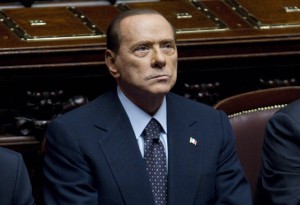Berlusconi to resign after parliament adopts reforms
ROME – Prime Minister Silvio Berlusconi was set to resign Saturday after 17 years at the top of Italian political life, as lawmakers prepared to give final approval to a package of key economic reforms.
Berlusconi has said he will step down once the measures he promised to the European Union are adopted in a session starting at 1130 GMT, after market turmoil raised fears that Italy could drag Europe into an unprecedented crisis.
A cabinet meeting at which Berlusconi could announce the resignation is scheduled for 1700 GMT after the parliament votes. The prime minister would then have to formally submit his resignation to Italy’s head of state.
There is little grief among ordinary Italians over the demise of Berlusconi, with latest polls giving him an approval rating of just 22 percent, but he did earn at least one tribute from counterpart and friend Vladimir Putin.
The Russian prime minister and likely future president saluted Berlusconi as “one of Europe’s greatest politicians”, referring to him as “one of the last Mohicans.
Article continues after this advertisement“That he was in power was an undoubted good for Italy,” he added.
Article continues after this advertisementBut many in the international community disagree and will be glad to see the back of the scandal-tainted premier who increasingly became the object of criticism from Italian companies who said he had turned the country into a joke.
The latest cover of The Economist, a news weekly that has had a long-running feud with Berlusconi since declaring him “unfit to lead Italy” in 2001, carried a photo of Berlusconi preening himself with the headline: “That’s all, folks.”
His most likely replacement is former EU commissioner Mario Monti, a 68-year-old economist who built a formidable reputation as a trust-busting bureaucrat in Brussels, but has no experience in political office.
Monti is expected to be nominated by Italian President Giorgio Napolitano to form a new government after Berlusconi’s resignation.
He has already won endorsement not just from top Italian political and business leaders but the financial markets.
Reports of Monti’s impending nomination helped boost investor confidence, with one market operator saying the economist was “worth 100 or 150 basis points on the spread” — the difference between Italian and German bond rates.
But large parts of Berlusconi’s centre-right coalition are pressing for early elections: the People of Freedom (PDL) party founded by the outgoing billionaire prime minister is on the brink of a schism over the nomination.
Berlusconi himself has said he would prefer early elections and has nominated PDL leader Angelino Alfano, a former justice minister and devout loyalist as his candidate.
But the final decision is up to Napolitano.
The Italian head of state, a former Communist Party leader, occupies a largely ceremonial role that only takes on significance at times of political crisis, such as these.
He has been locked in closed-doors talks to push for a new government.
The European Union has warned Italy against an election campaign now. Analysts fear it could deepen political and financial turmoil in the country and possibly detonate a blow-up of Italy’s worryingly high mountain of debt.
The uncertainty in Italy has prompted global concern, with Napolitano fielding calls from US President Barack Obama, German President Christian Wulff and French President Nicolas Sarkozy for updates on the crisis.
The combination of Italy’s 1.9-trillion euro ($2.6-trillion) debt, its extremely low growth rate and high borrowing costs have raised concern that it could be cut off from commercial debt markets within months.
The International Monetary Fund and the European Financial Stability Facility (EFSF) have both reportedly offered financial help, but economists warn that the size of Italy’s economy may make the country “too big to bail”.
After his resignation, Berlusconi will remain a member of parliament for his party. He has given few hints about what he plans to do, apart from telling one interviewer he would like to help out on election campaigns.
Analysts say he may be forced to stay in politics if only to protect his troubled business interests and hold on to some immunity in three ongoing trials against him for bribery, tax fraud, abuse of power and sex with a minor.
